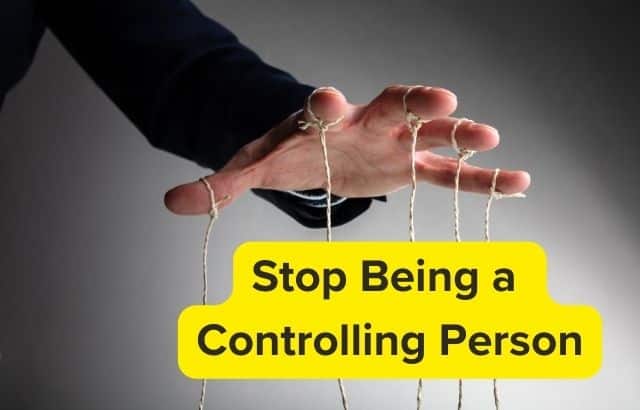It’s perfectly natural to want a degree of control over your life. After all, managing our daily routines and pursuing our goals requires some level of organization. However, if you find yourself questioning, “Am I controlling?” it may be a sign that you’ve crossed the line from healthy management into excessive control. This can negatively impact your relationships, career, and overall well-being, as highlighted by noted business Strategist Hirav Shah.
Hirav explains, “It’s common to start the day worried about your plans, but when you also fixate on the needs and fears of others—friends, colleagues, or even strangers—you might be adopting an unhealthy mindset. This approach, driven by anxiety, rarely yields effective solutions to life’s uncertainties.” Over time, this need for control can lead you to wonder, “Why am I controlling?”
Table of Contents
Why DO I NEED TO CONTROL EVERYTHING?

The desire for control often stems from the Six Human Needs that drive our decisions. One of these is certainty, the need to avoid pain and gain pleasure. Additionally, the need for significance—the feeling of being valued—can contribute to controlling behavior.
When these needs go unmet, feelings of fear and self-doubt can arise. Emotional health experts note that individuals often resort to controlling behaviors as a temporary fix for anxiety. The underlying belief may be, “If I can control my circumstances, I can ensure that my life remains stable.” This pursuit of absolute security leads many to attempt controlling everything, from their relationships to their finances and even the lives of those around them.
If you find yourself asking, “Am I controlling?” consider your upbringing. Perhaps you were raised in an environment where security was lacking or where caregivers displayed excessive control themselves. This upbringing can lead to adult behaviors that cling tightly to the need for control.
AM I CONTROLLING? 7 SIGNS OF A CONTROLLING PERSON

Considerably under the best of conditions, it’s not difficult to feel that everything should turn out well for you to find a sense of contentment with your life. While this is consistent with a point – being a successful person, for instance, has clear advantages for people and society – zeroing in on control without leaving space for development is a catastrophe waiting to happen.
Try not to let an undetected, unbending need for control wreck healthy connections and satisfaction in life. Here are some indications that you need to address your controlling personality – and change the response to “Am I controlling?” to “no,” unequivocally.
YOU’RE A PEOPLE PLEASER

You may have learned in youth that satisfying individuals is the course of security and happiness. Notwithstanding, in adulthood, being too centered around satisfying others is a certain way to disillusionment since it’s difficult to satisfy everybody constantly.
YOU’RE A PERFECTIONIST
The need for control frequently shows, chasing out of reach flawlessness. While it appears to bode well that hairsplitting guarantees a good outcome, actually compulsiveness is a two-sided deal, making dreams of safety and self-detesting. Regardless of what you accomplish, you wind up in an impossible to win predicament.
YOU PROCRASTINATE

Here is the extraordinary incongruity of hairsplitting: You need flawlessness so gravely that you are overpowered by the means important to accomplish it. You dread disappointing others and the mind-boggling responsibility it would take to accomplish the outlandish, so you put off any activity at all.
YOU ARE CRITICAL OF OTHERS

Compulsiveness and projection go inseparably. At the point when you are twisted on flawlessness, you can’t accept the defective pieces of yourself, which you at that point project onto others as inordinate criticism. At the point when you’re excessively critical of others because of the absurd requests you put on yourself, you set your connections up for disappointment.
YOU ONLY ACCEPT THE BEST
Search for the manners by which you accept simply the best or nothing by any means. This sort of dark or white reasoning fuels maladaptive practices that keep you disappointed with, for all intents and purposes, everything.
YOU FEEL LONELY

Hairsplitting and its companion, self-abhorring, can make us seclude from others because of a dread of dismissal. We are neglecting to perceive that the genuine purpose for our need for control stems not from others’ activities but rather from our own absence of self-certainty. We become unfit to interface with others because of the nonsensical requests we put on them.
YOU CAN’T LET MISTAKES GO
You fret over nothing and think about everything literally, regardless of whether it has anything to do with you or your presentation. This approach prompts interpersonal outcomes that will crash practically the entirety of your connections.
Most Effective Method to LET GO OF THE NEED FOR CONTROL
Since you know the indications of a controlling person, you’re likely ready to respond to the inquiry “Am I controlling?” honestly. On the off chance that the appropriate response is “yes,” don’t worry. There are four moves you can make to help soothe your need for control.
Perceive YOUR ANXIETY
Compulsiveness and control are at last about anxiety – in spite of the fact that you may not notice, on the off chance that you never stop yourself from controlling everything. In the event that you have a controlling personality, the following time you have a desire to re-try an assignment or advise somebody how to accomplish something, stop yourself. How would you feel? Perceive your anxiety, take a few breaths and let it pass.
CHANGE YOUR SELF-TALK
When you’re ready to perceive your sentiments, you’ll have the option to supplant negative considerations with enabling ones, shift your mindset and control your anxiety – and your need for control. Rather than dramatic contemplations about frightful things occurring, self, talk, ask yourself how sensible your apprehensions are. What’s actually the most terrible thing that could occur? At the point when you change your words, you completely change yourself.
PRACTICE COMMUNICATION

The response to “Am I controlling?” may likewise be “now and then.” You may live with the two people who are subject to your capacity to “control” the circumstance (like your kids) and the individuals who need you to ease off (like your accomplice and associates). This situation can place you in an awkward corner; however, the key is communication. Tune in to your accomplice’s needs. Ask your associates how you can improve. Give up a touch of control with your kids. The need for control doesn’t need to demolish connections.
Embrace RELAXING HABITS

Healthy habits like contemplation, preparation, and perception can help you ease anxiety, center your energy and make a stride back from worrying, “For what reason do I need to control everything?” Self-care is another fundamental practice on the off chance that you have a need for control. Make investing some time part of your everyday schedule, and you’ll see moment benefits in your perspective.”
Stop Being Controlling FAQs answered by Hirav Shah

What are the signs of a controlling person?
Answer: Signs include people-pleasing, perfectionism, procrastination, excessive criticism, all-or-nothing thinking, feelings of loneliness, and an inability to let go of mistakes.
How can I stop being controlling?
Answer: Start by acknowledging your anxiety, changing negative self-talk, practicing open communication, and embracing relaxation techniques.
What triggers the need for control?
Answer: Triggers often stem from unmet emotional needs like certainty and significance, leading to anxiety and self-doubt.
Can controlling behavior affect relationships?
Answer: Yes, controlling behavior can create resentment and strain in relationships, leading to communication breakdowns and emotional distance.
Is it possible to change controlling behavior?
Answer: Absolutely! Change requires awareness, practice, and patience, but it is entirely possible to develop healthier habits and relationships.
Conclusion

Hirav Shah concludes by saying, “Changing our behavior and thoughts takes practice. We unconsciously and naturally want to drift back to our old habits. Try this mantra that can help you keep your aim front and centre…
- I don’t have to control everything.
- I can accept uncertainty.
- Furthermore, I can control only myself.
- My way is not the only way.
- I will tolerate other people’s choices.
Try to be patient with yourself. Change is a process, and you’re demanding a lot of yourself”















